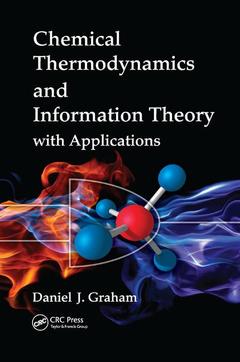Description
Chemical Thermodynamics and Information Theory with Applications
Theory with applications
Author: Graham Daniel J.
Language: English
Subjects for Chemical Thermodynamics and Information Theory with...:
Keywords
Vice Versa; Maximum Entropy States; mutual; Electronic Messages; state; Van Der Waals Equation; points; Monatomic Ideal Gas; shannon; Formula Diagrams; ideal; Carnot Cycles; gas; Chemical Equilibrium; van; Equilibrium; der; Chemical Potential; waals; Ideal Gas; equation; Thermal Collision; State Point; Thermodynamic Pathways; Message Tapes; Reversible Pathways; Van Der Waals Constants; Chemist Query; Message Unit; Left Side Pressure; pV TS; Neon Atom; Total Entropy Change; Shannon Information; Chemical Thermodynamics
Publication date: 09-2018
· 15.6x23.4 cm · Paperback
Publication date: 07-2011
230 p. · 15.6x23.4 cm · Hardback
Description
/li>Contents
/li>Readership
/li>Biography
/li>
Thermodynamics and information touch theory every facet of chemistry. However, the physical chemistry curriculum digested by students worldwide is still heavily skewed toward heat/work principles established more than a century ago. Rectifying this situation, Chemical Thermodynamics and Information Theory with Applications explores applications drawn from the intersection of thermodynamics and information theory?two mature and far-reaching fields.
In an approach that intertwines information science and chemistry, this book covers:
- The informational aspects of thermodynamic state equations
- The algorithmic aspects of transformations?compression, expansion, cyclic, and more
- The principles of best-practice programming
- How molecules transmit and modify information via collisions and chemical reactions
Using examples from physical and organic chemistry, this book demonstrates how the disciplines of thermodynamics and information theory are intertwined. Accessible to curiosity-driven chemists with knowledge of basic calculus, probability, and statistics, the book provides a fresh perspective on time-honored subjects such as state transformations, heat and work exchanges, and chemical reactions.
Information in Thermodynamics and Chemistry. Countable States, Distribution Functions, and Information. Heat, Work, and Information. Transformation Pathways. Economical Pathways. Information, Thermochemistry, and Molecules. Transforming a Molecule's Information. New Horizons.
Daniel J. Graham is with the Department of Chemistry at Loyola University in Chicago.
These books may interest you

Principles of Thermodynamics 78.93 €



